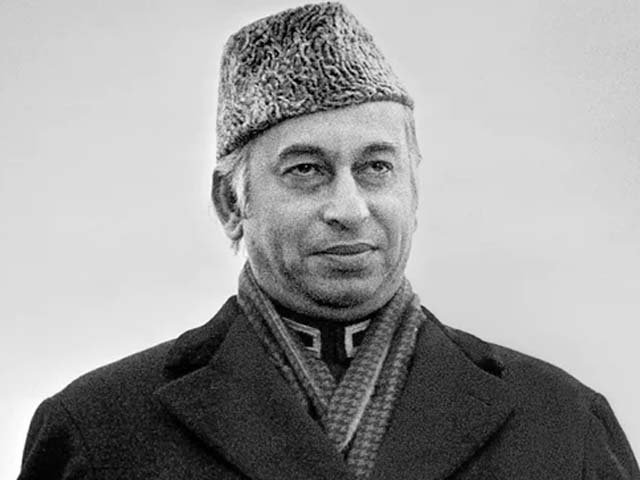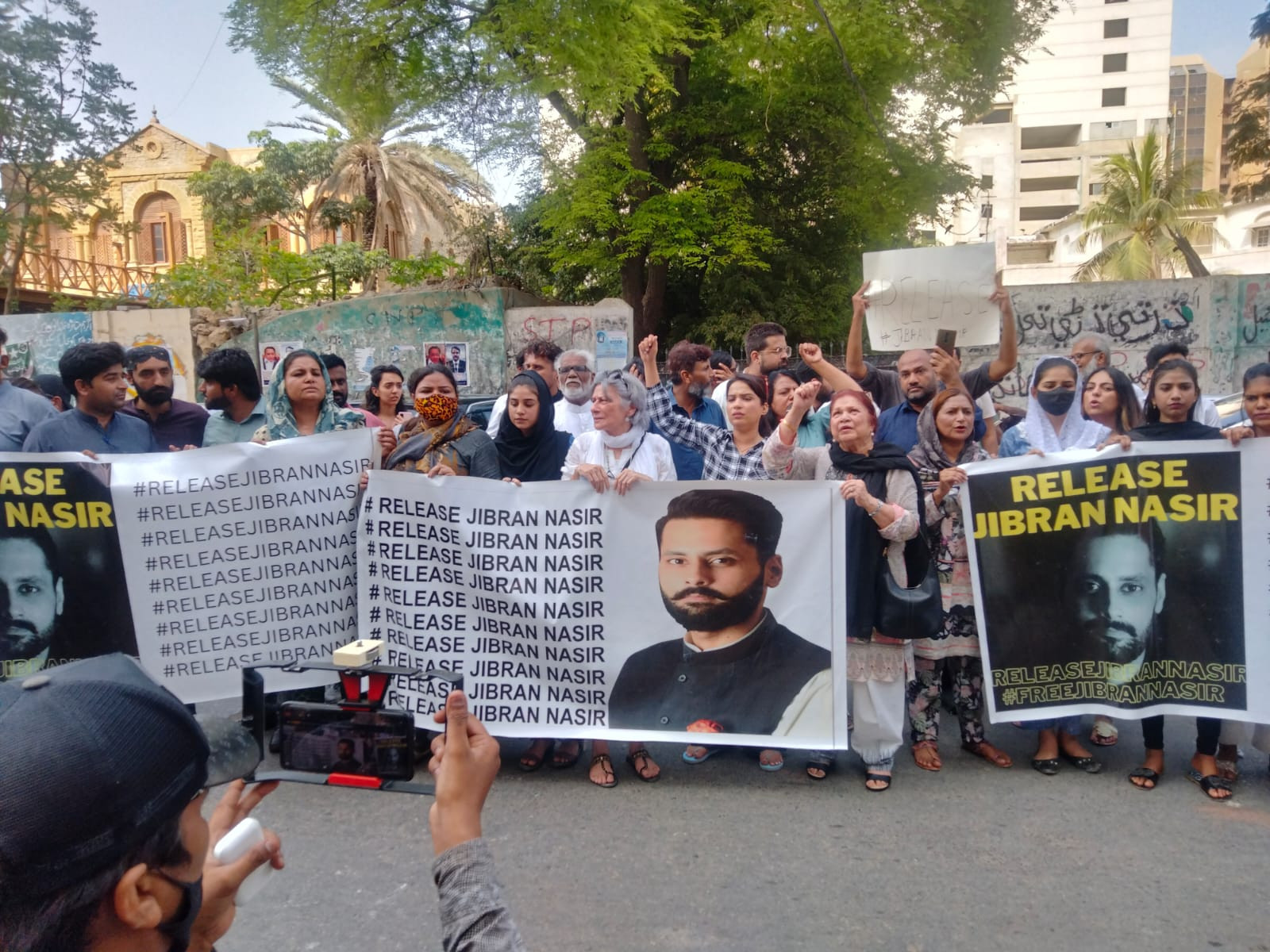
Zulfikar Ali Bhutto, 1976. PHOTO: AFP/ GETTY IMAGES.
Bhutto was neither a total villain nor a complete Messiah
How could he alone contribute, launch and then thwart a socialist version of left politics?
I remember going through Stanley Wolpert’s book called ‘Zulfi Bhutto of Pakistan: His Life & Times’ on this enigmatic politician. The first sentence more or less defines Zulfikar Ali Bhutto’s legacy. Wolpert, while researching his book on Muhammad Ali Jinnah wrote that, during his stay in Pakistan, he found out that people either hated or loved Bhutto. He also wondered about the amazing contradictions in the personality of this remarkable politician.
Today, as we stand in 2017 and look back into the strange chequered history of this country, no discussion on politics, culture, economic and social ideology, military and its role in politics, and the politicisation of masses cannot even begin without Bhutto. His contribution and impact has been tremendous. A few may object and say why not move on? The world has moved on after all. Why are we time frozen in 1970s? Why can we not let go of our obsession with Bhutto? This is 2017 after all and we are confronted with so many problems.
Well in my opinion, history reveals a collective psychology of nations and no discourse on history is ever enough. Whatever we see in our political and social fabric today was sown in the past and an understanding of said past is a prerequisite for understanding the present. Thus the past cannot be understood without discussing Bhutto. Moreover, Bhutto has to be demystified and the right balance has to be found in our judgment of him. Frankly he was neither a total villain nor a complete Messiah and this recognition is important both for much needed de-Bhutto-fication of the Pakistan Peoples Party (PPP) and also to pacify the needless and often exaggerated opposition against him.
So how do we evaluate his influence and impact?
Firstly, Bhutto can rightly be credited with actually creating mass oriented populist politics in Pakistan. His most important contribution was arousing a collective feeling in the masses that they were definitely a factor to reckon with. He was able to galvanise support and induce street politics; he allowed masses to become stakeholders as well as factor to reckon with. His contribution in introducing street politics even transcends his contribution towards the formulation of the liberal left. The politics of protest as well as using people as an effective force to reach the ultimate objective effectively started with Bhutto. This kind of politics was subsequently adopted by his opponents and over the years by various parties. Moreover, his styles of oratory and engagement tactics were also aped by various parties and their leaders.
Secondly, Bhutto is credited for popularising and in fact assembling the left-leaning political spectrum into a cohesive electable mass. There is also substantial merit in this assertion although frankly he, by no means, was an indoctrinated socialist. He was basically a populist who was able to gauge correctly the despair caused by the rising inequalities of the Ayub Khan era and used it to his political advantage. But he was the one who transformed left-wing politics and made it mainstream and this is a huge progressive achievement.
While this had a definite advantage for the genuine leftists initially as leftism became popular due to him, subsequently this also became a hindrance. Mind-sets generally are the product of the class you belong to and Bhutto was no exception. Feudal mind-sets went hand-in-hand with political acumen and sensitivity. This mind-set, despite his adopted ideology could not change and hindered leftists after providing a break through.
The composition of PPP candidates started to reflect increased feudal components over the years and left-wing stalwarts like Jalaludin Abdur Rahim were thrown out and some of the others simply went into oblivion. Bhutto thus contributed towards socialism initially but his feudal background gave rise to conflicts of interest. This conflict of interest partly explains why land reforms were not effectively carried out while the nationalisation of industries went overboard. Thus, despite a conducive environment for land reforms, the landed aristocracy not only survived but subsequently even thrived. Moreover, PPP’s steady descent from a social democratic party into a strange ragtag of liberal cum feudal ideologies owes a lot to Bhutto’s own background and the way he conducted himself.
But how could he alone contribute, launch and then thwart a socialist version of left politics? This actually brings us to the third undoubtedly important impact of Bhutto and that was his personality politics. Personality politics is often the characteristic of many developing countries. Here electorates often start equating a party with a charismatic individual who is generally also responsible for founding or popularising the party.
In Pakistan, Bhutto was a charismatic person who developed a cult-like following. By no means is he the creator of this concept as this has been witnessed in many other parts of the world also but in Pakistan it initiated with him and gathered pace subsequently. Apart from PPP, this also had a significant impact on the course of development of other parties. The ‘success’ of Bhutto in this respect also paved the way for the other parties to follow suit whether deliberately or because this was what seemed to work. Today, the Muttahida Quami Movement (MQM), the Pakistan Muslim League-Nawaz (PML-N) and the Pakistan Tehreek-e-Insaf (PTI) are all modelled on the same personality template.
This had a regressive impact on PPP as it gave Bhutto unaccountable power over party affairs and virtually insulated him from all criticism. Moreover, it extended even after his death to such an extent that once Benazir Bhutto was accepted as an heir to his legacy she was able to whip the party in accordance with her own desires. Unfortunately, in order for PPP to remain ‘in’, it had to constantly use the Bhutto mania and this in the longer run has proven to be catastrophic. In fact during the life of Benazir, there were calls for the de-Bhuttofication of PPP by liberal intelligentsia thwarted by the party itself. Even though by then, everyone knew that PPP and the Bhutto name were one and the same thing.
Thirdly and an extremely important aspect which is sometimes overlooked due to the ‘liberal’ credentials of Bhutto and his tragic end at the hands of far more hard-line Ziaul Haq, is the strategic use of political Islam. Bhutto tried to use Islam for ‘pragmatic’ purposes such as appeasing Islamic hardliners to soften their opposition to his rule and also as a rallying and uniting point in the post East Pakistan debacle scenario.
Bhutto’s role in the second amendment, which declared Ahmadis non-Muslims, and his efforts to elevate Pakistan to a prominent role in the Islamic world could be construed as efforts to use religion for strategic purposes. He combined selective Islamisation with the purging of the extreme left in his party. That was actually a secular blunder with devastating aftermaths. Appeasement did not soften the hardliners; it merely made them stronger and pushed Bhutto to the wall in 1977. More importantly, it effectively began a trend where the government would bow to the wishes of the hardliners and paved way for the subsequent Islamisation of Pakistan. By no means is it fair to say that Bhutto was the sole perpetuator of this trend. But he cannot be absolved also.
Fourthly, there was a big impact on the economic front. The economic reforms by Bhutto were heavily influenced by the outcome of Ayub’s policies particularly the doctrine of functional inequality and the industrialisation process which was conducted by the transferring of resources from agriculture to large-scale manufacturing. Bhutto in sync with grievances caused by Ayub’s reforms, both in the working class as well as the land aristocracy, went for nationalisation of industries, the banking sector and even the educational institutions. In hindsight, it may seem like a wrong decision but at that time nationalisation was in vogue. The 70s were a decade of ‘anti-materialism’ and great leaps were being taken to project collective interest over individual “greed”. What Bhutto did was perfectly in tune with the global mood of the time.
However, the way nationalisation was carried out without concomitant effective land reforms did have an overall regressive impact. It hit industrialists and middle class too much while tilting the balance in favour of the landed aristocracy. To some extent, what followed later was the outcome of Bhutto’s policies. The economic reforms of the 90’s under various structural adjustment programs were primarily focused at undoing Bhutto’s economic steps. The losses made by state enterprises cast a shadow over the role of the public sector in management of such enterprises and forced a change of position even with PPP’s regard to this.
Thirty-eight years have passed since Bhutto’s death but his legacy is still strong. In my mind he was by far the most influential individual in the history of Pakistan and our judgment in the end has to be based on his influence over the course of history. Some of his negative influences were purely unintended but nevertheless emanated from him. It is very difficult to see what the political landscape would have turned out to be if he was not executed. But we would have probably been better off.
Bhutto was an extraordinarily intelligent person who would have eventually moved towards the centre-left rather than staying on a confrontational left position. In some ways, his death unfortunately triggered many subsequent events which have proven disastrous for Pakistan chiefly being Pakistan’s move towards state sponsored religious right of the political spectrum.
As I said earlier, Bhutto was not an angel or for that matter a complete villain. He was a product of his times and his personal conduct has to be evaluated accordingly.
And he died tragically. As one my friends always reminds me, Bhutto was murdered by the establishment and in that death perhaps paid some of the dues.
“Woh jo qarz rakhtey they jaan par woh hisaab aaj chuka dya”.
(The pledge we owed on ourselves, we have honoured today).
[poll id="749"]




COMMENTS (13)
Comments are moderated and generally will be posted if they are on-topic and not abusive.
For more information, please see our Comments FAQ